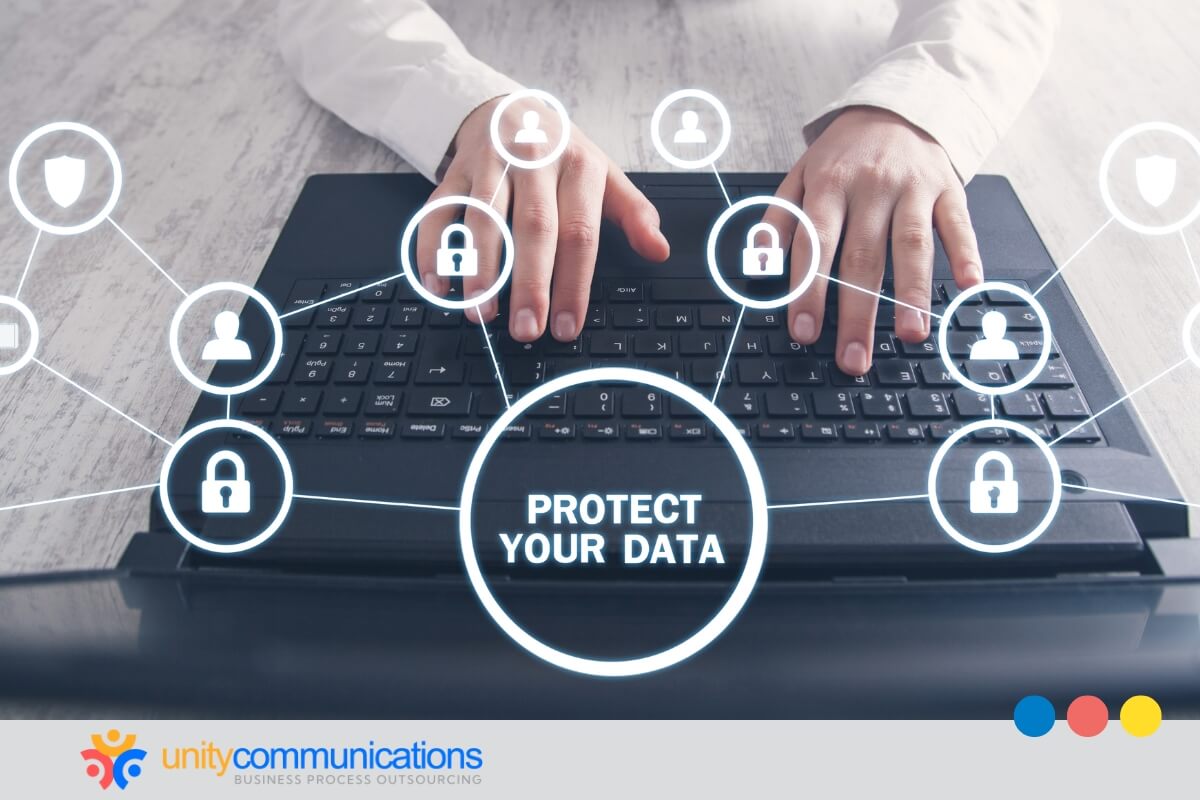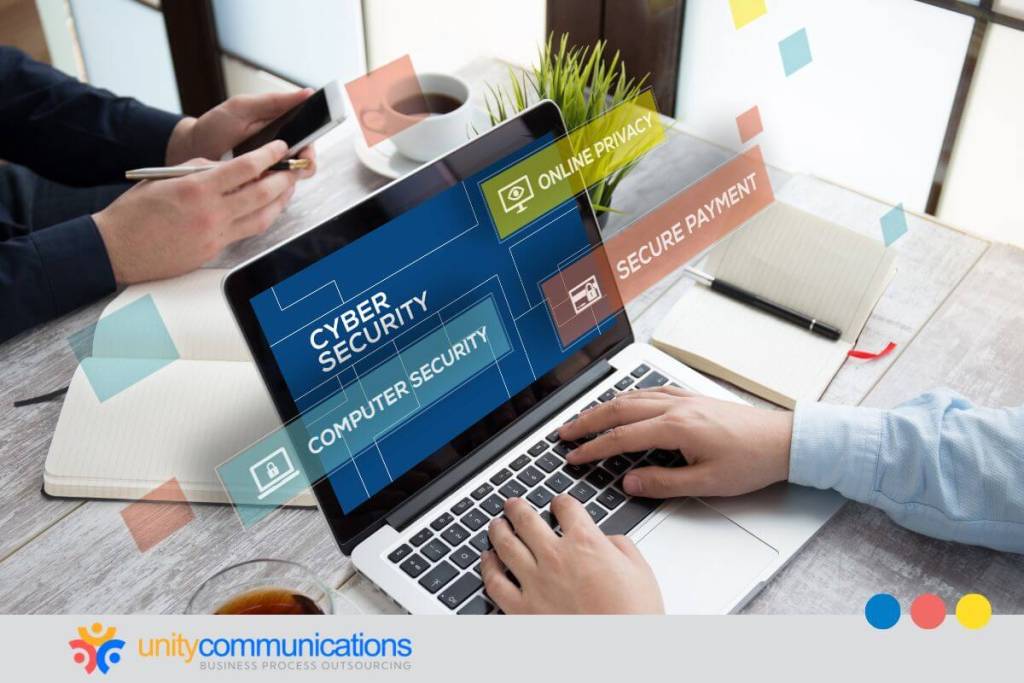IN THIS ARTICLE
Table of Contents
Learn more about outsourcing services for Phoenix businesses. Watch the video below.
E-commerce brands are hot targets for cybercriminals. They are treasure troves of financial and personal information for online thieves. Data breaches can damage the finances and reputation of online retailers, big and small.
E-commerce businesses in Phoenix understand this issue and the growing importance of cybersecurity best practices. Hence, many online retailers partner with business process outsourcing (BPO) companies to manage e-commerce data security.
Local e-commerce business owners stay competitive using innovative technologies. Likewise, bad actors hone their skills and find new vulnerabilities to exploit. Staying ahead of these threats requires following cybersecurity best practices for e-commerce. Let us discuss it further!
Cybersecurity Best Practices for E-commerce Business

Data security in e-commerce is becoming increasingly important as more people shop online. The are 2.71 billion online shoppers in 2024, which will increase by 2.7% next year. Thus, companies must adopt cybersecurity best practices to safeguard customer data against thieves.
E-commerce cybersecurity encompasses the following aspects:
- Payment security protects online payments from potential intrusions during transactions.
- Data security ensures the protection of customer data, such as names, social security numbers, physical addresses, and credit card details.
- Website security safeguards the e-commerce website from being compromised or hacked.
Cybersecurity is vital to an online store, especially when using outsourced e-commerce services. The following section lists various strategies to effectively protect your Phoenix-based business and customers.
Design Security Policies
Set clear cybersecurity policies to protect your e-commerce business and your customers. All team members must understand and follow established procedures. This cybersecurity best practice helps protect business and customer data.
Additionally, encrypt all transactions to guard confidential information from bad actors.
Understand the regulatory and legal requirements that apply to your online store and adhere to them accordingly. One example is Arizona’s Telephone Solicitations statute, which mandates telemarketers to disclose certain information and prohibits certain misrepresentations.
Use Secure Payment Methods
Safe payment methods are one of the most crucial elements of running an e-commerce store in Phoenix. Ensure that your web page is secure and has a Secure Sockets Layer (SSL) certificate.
If not required, avoid storing cardholder data or using a combination of secure server technology, such as Hypertext Transfer Protocol Secure (HTTPS), and encryption tools. You can also encourage end customers to use string passwords and pair hosted payment forms with CAPTCHA.
Leverage Secure Servers
Another cybersecurity best practice is to use secure server technologies. These systems guarantee the encryption of information shared over the internet. Encryption makes accessing private information, such as end-user passwords and credit card details, more difficult for cybercriminals.
Secure servers also let e-commerce stores in Phoenix authenticate customers, helping guard against unauthorized access. Online shop owners can tap an offshoring provider in the Philippines to deploy this solution. With secure server technology, companies can ensure that customer data is safe. Thus, consumers can have peace of mind when buying online.
Deploy Strong Authentication Methods
Deploying secure payment modes and cybersecurity policies are just the initial steps. Phoenix-based e-commerce businesses must find more ways to protect consumer data. Strong authentication is one option. This step asks buyers to provide additional verification or information before completing a transaction or accessing their accounts.
A common example of a strong authentication method is two-factor authentication (2FA). 2FA lets the shopper enter a one-time pin via SMS or email before logging in to their account. Strong authentication guarantees that only authorized users can access private information, minimizing the possibility of fraud.
Update Software Regularly
Frequently updating your software and applications is vital to protecting your e-commerce site from security threats. Hence, it would help if you kept up with new updates for your applications and software. These patches can contain security fixes that protect your website.
It is also important to monitor your website’s domain name and Internet Protocol (IP) address for malicious activities. Once you suspect any suspicious activity, immediately protect your business and end customers. Doing so helps guarantee that your online store is safe and secure from cyber threats.
Safeguard End Customer Data
Protecting customer data requires you to only collect the necessary information. To do this, you must understand the requirements in Arizona and know what your company needs. Encrypting personally identifiable information (PII) is crucial to safeguarding customer data.
Moreover, you can use HTTPS security and an SSL certificate to keep user financial information safe and encrypt traffic. Using a trusted e-commerce platform with updated security and privacy measures also keeps customer data protected. You can work with a BPO company in Phoenix to access the best e-commerce tools.
Ensure Safe Data Storage and Backup
Secure data storage and backup systems are important in any e-commerce company’s cybersecurity plan. Secure data storage protects end-user data from malicious actors. Business owners can also implement various tactics to ensure proper data storage and backup.
One solution is to encrypt information to prevent access without an encryption key. Another is to use reliable hosting services, such as virtual private networks (VPN) and cloud computing tools, that provide robust protection and a firewall against cyber criminals. Lastly, organizations must have regular data backups in case of a natural disaster or breach.
Choose Secure Network Management Solutions
E-commerce businesses must set up secure network management procedures to protect company and customer information. These systems are vital as the world continues to rely on digital tools for transactions and sensitive data storage. Secure network management software monitors and detects unauthorized access attempts and suspicious activities.
Good email software can also help detect malicious emails and attachments before they reach your inbox. You can also configure email filtering to block spam messages for your staff. Keeping such messages out of their inbox prevents staff from opening dubious links or downloading malware.
Common Cybersecurity Issues in E-commerce

Issues in e-commerce cybersecurity are almost uncountable. They come in different types and forms, but you can avoid them by following the cybersecurity best practices mentioned above. Here are the most common security risks for e-commerce businesses:
- Hacking: This is a general term for any intrusion attempt by an individual or a group of bad actors. Hacking happens when unauthorized personnel get access to your e-commerce site’s backend. Hackers can then use it to steal private customer information, make your online shop unavailable to buyers, or damage your website.
- Malware infection: This happens when your company’s devices become infected with malware. Malware is often used to take your site down or steal your buyers’ data.
- Phishing scams: Phishing involves posing as a legitimate individual or company to trick users into sharing their confidential data. These scams involve fake email addresses or websites. Email domains without Domain-based Message Authentication Reporting and Conformance (DMARC) protocol are often used for spoofing and phishing.
- Data breaches: Data breaches refer to stealing or leaking customer data. It occurs when private data becomes public due to a human error or an attack. For example, an employee accidentally spills private data or an attacker gets access to the company database. In Arizona alone, 600,000 records were exposed in the last two years.
- Denial of Service (DOS): DOS happens when a bad actor takes down your e-commerce website by bombarding it with requests and traffic. Cybercriminals do this for fun or to extort money from your business.
Prevent these cybersecurity problems by staying updated on the latest security measures. You can also partner with an outsourcing provider to manage data security for you. They have the newest technologies to keep your business and customer data protected. Just make sure to follow outsourced customer service tips before starting.
The Importance of Maintaining Cybersecurity for E-commerce Businesses
Implementing cybersecurity best practices is important for e-commerce businesses in Phoenix and their customers. These strategies secure online transactions, shield customer data from breaches and leaks, and guard against malicious actors taking down or hacking your website.
Maintaining cybersecurity also helps foster trust between your brand and your shoppers. It also enables you to avoid the expensive consequences of data breaches. You can reap all of these benefits by following the principles of customer-centric outsourcing and partnering with a reliable e-commerce outsourcing vendor.
Here is a closer look at the importance of adopting cybersecurity best practices for e-commerce.
- Enhancing brand reputation. E-commerce entrepreneurs must strive to stand out against rivals due to the market’s high saturation. Implementing cybersecurity measures increases the confidence of stakeholders and potential customers. Conversely, companies might experience reputational damage if security practices are not followed.
- Nurturing customer trust: Building customer trust with cybersecurity practices is a client-centered strategy that can help e-commerce businesses retain current shoppers and attract new ones. Establishing customer trust involves showing them that you take good care of their information, even with e-commerce customer service outsourcing.
The Bottom Line

As an e-commerce business owner in Phoenix, you must safeguard confidential company and customer data to foster trust and boost brand reputation. However, you must follow cybersecurity measures to do so. Once done, you can encourage potential investors and customers to trust in your operations and support your organizational growth while maintaining credibility.





